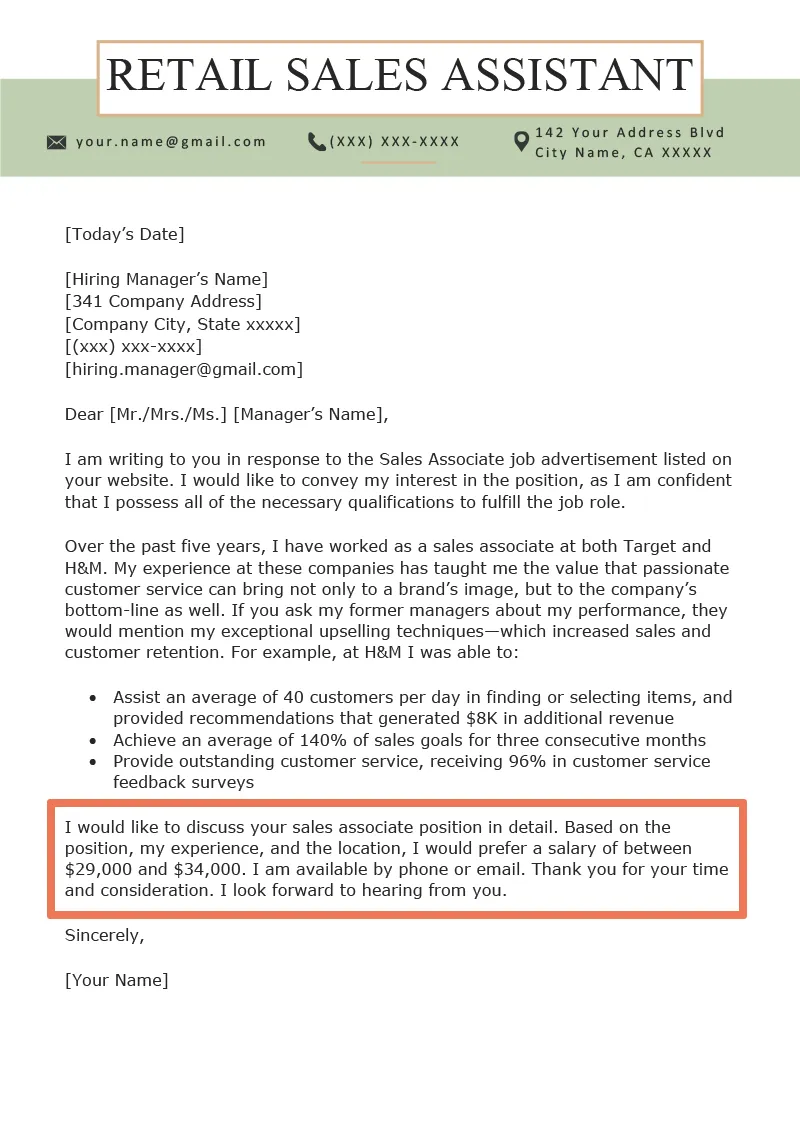Understanding Salary Requirements in Cover Letters
Addressing salary expectations in your cover letter is a critical step in the job application process. It shows you’ve considered the position’s value and your worth, setting the stage for a successful negotiation later on. Whether you’re a seasoned professional or just starting your career, properly handling this aspect of your cover letter can significantly impact your chances of securing an interview and ultimately, the job offer. It’s about finding the right balance between being upfront about your needs and remaining flexible to ensure you don’t price yourself out of the running too early. Remember, the way you present your salary expectations can signal professionalism and preparedness to potential employers. Mastering this can greatly improve your application.
Why Salary Matters in Your Cover Letter
Including a salary expectation, or at least addressing the topic, helps employers gauge whether they can afford you. It also indicates you have researched the role and understand its value. While it’s tempting to avoid the topic, doing so might leave the employer unsure if your expectations align with their budget. A well-crafted cover letter will frame your salary expectations in a way that reflects your value and aligns with industry standards. This is about showing that you are proactive and understand the business side of employment. Avoiding the salary conversation can lead to delays in the hiring process. Make sure you do not miss the chance to discuss it.
Benefits of Addressing Salary Early
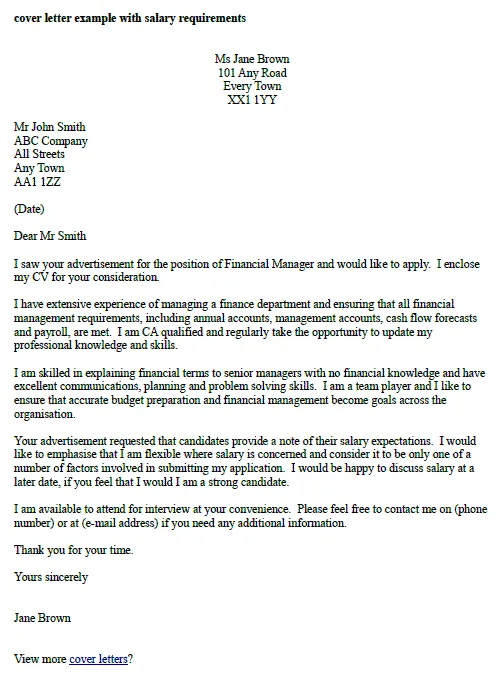
Addressing salary early in your cover letter can save both you and the employer valuable time. If your expectations are drastically different from what the employer can offer, it is better to know this early. This approach demonstrates confidence and professionalism. By providing a clear statement or a salary range, you give the employer a clear understanding of your expectations and can make an informed decision regarding your application. This also ensures that you’re not wasting time interviewing for a position that won’t meet your financial needs. Including the salary expectations is about respecting the employer’s time.
Best Practices for Stating Salary Requirements
The key to stating your salary requirements effectively in a cover letter is to be both clear and strategic. You want to provide enough information to satisfy the employer without inadvertently limiting your options. Research is your best friend; knowing the typical salary range for your role and experience level will empower you to make a confident and informed decision. Being overly specific can limit your negotiation room, while being too vague might leave the employer uncertain. Tailoring your approach to the specific job and industry is crucial. By following the best practices, you can increase the chance of landing the job and get the salary you deserve.
Researching Salary Ranges
Before mentioning salary in your cover letter, conduct thorough research. Use online resources such as Salary.com, Glassdoor, and LinkedIn Salary to get an understanding of the average salary for similar positions in your location. Look at job postings that provide a salary range. These resources help you gauge industry standards and establish a realistic expectation. Researching will allow you to justify your expectations during salary negotiations. If the employer is asking for your desired salary, provide a range. If the salary expectations are not listed, you can ask what is the expected salary range or what is the salary budget for the position.
Using Salary Negotiation Phrases
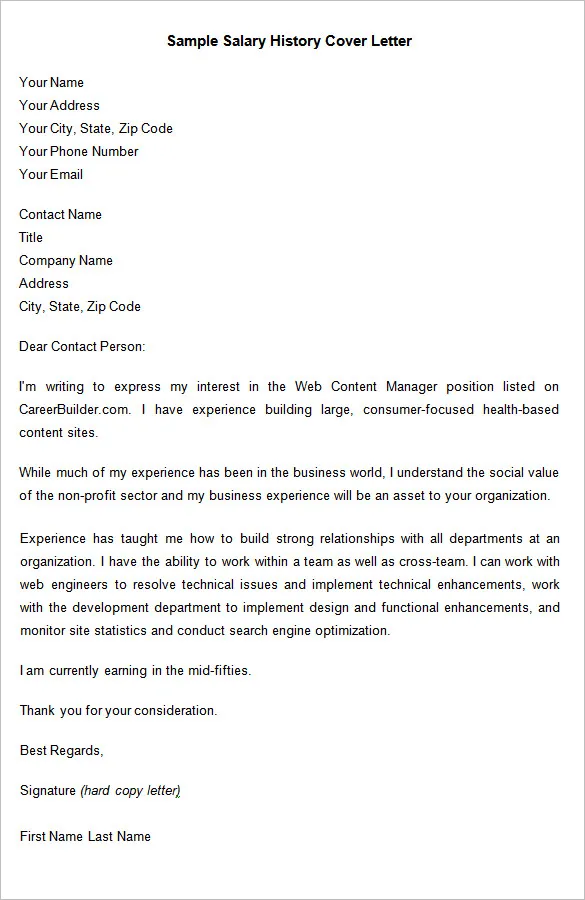
Phrasing is important. Instead of directly stating a fixed number, consider using phrases that indicate openness to negotiation. For example, you might say “My salary expectations are in the range of $X to $Y, based on my experience and the responsibilities of this role.” Or, “I am seeking a competitive salary commensurate with my experience and the market rate for this position.” These phrases are designed to signal your openness to negotiation and your understanding of the employer’s needs. Remember to sound confident and professional, because this will help you leave a positive first impression and show that you are a great asset.
Providing a Salary Range
When you’re asked to provide a salary expectation, offering a range is often the most strategic approach. This approach shows flexibility while still conveying your financial needs. The range you provide should reflect your market research and experience. Keep the difference between the low and high end of the range reasonable, to avoid looking unrealistic. Using a salary range offers an opportunity to discuss your value to the employer. It also allows for some level of negotiation should you be offered the job. It is the most effective way to demonstrate your openness to negotiation.
Cover Letter Examples with Salary Expectations
Here are a few examples of how to incorporate salary expectations in your cover letter, tailored to different experience levels and circumstances. These examples are meant to be adaptable, so you can customize them to your own needs and the specific roles you are applying for. The key is to be clear, professional, and always tailor your approach to fit the specific job and the company’s culture. These will provide a clear picture of how to present your salary expectations in your cover letter.
Example 1 Entry-Level Position
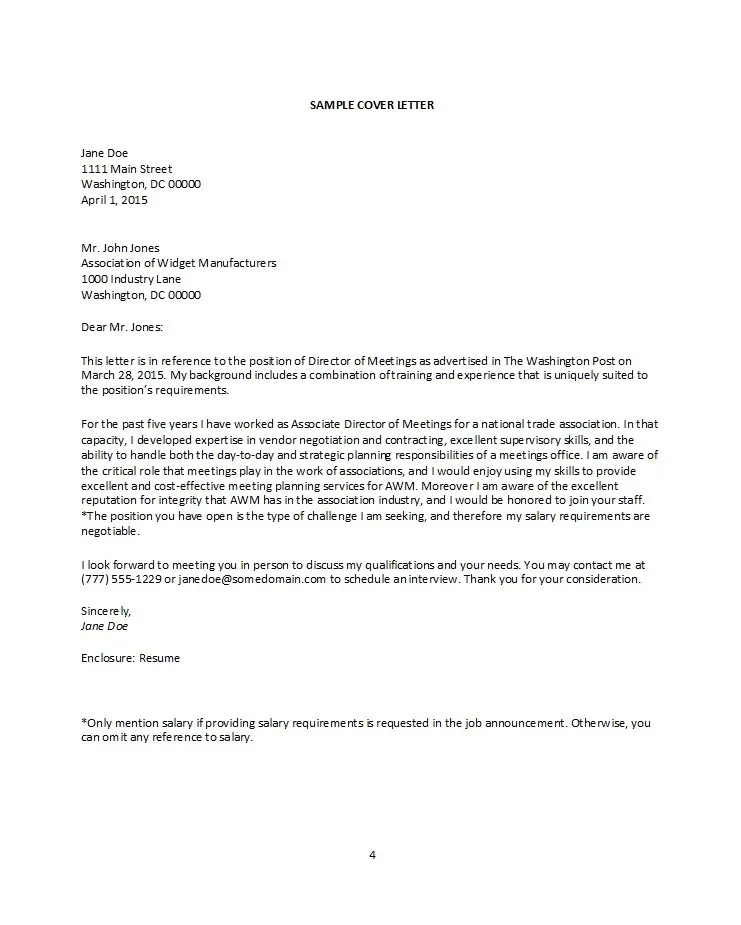
For an entry-level position, you might write something like: “I am eager to contribute my skills to your team and am seeking an entry-level salary in the range of $45,000 to $50,000, based on my recent academic achievements and the responsibilities outlined in the job description.” This demonstrates that you have an understanding of the market rate and are open to negotiating, but the goal is to get an interview and the job. Be mindful of the potential to discuss the salary at an interview. You might also mention any relevant internships or academic achievements that help strengthen your candidacy.
Example 2 Mid-Career Position
For a mid-career position, you have more experience to leverage. Consider: “With over five years of experience in project management, I am seeking a salary in the range of $75,000 to $85,000, commensurate with my proven track record of delivering successful projects and my expertise in agile methodologies.” Here, the salary expectations are linked directly to your experience and accomplishments. It also highlights relevant skills and showcases your value. Demonstrating that you have knowledge and experience will increase the chances of getting a job offer. Remember to provide the salary range and be realistic about your expectations.
Example 3 Senior-Level Position
For a senior-level role, you can confidently state your expectations, like this: “Based on my extensive experience in leading marketing teams and driving revenue growth, I am seeking a salary in the range of $120,000 to $140,000, along with opportunities for performance-based bonuses.” In this example, you are emphasizing your leadership experience, the skills you bring to the table, and any additional benefits. Be prepared to discuss your compensation history and demonstrate the value you offer to the company. Senior roles require a strategic approach in discussing salary, so always remain professional and confident.
Mistakes to Avoid When Discussing Salary
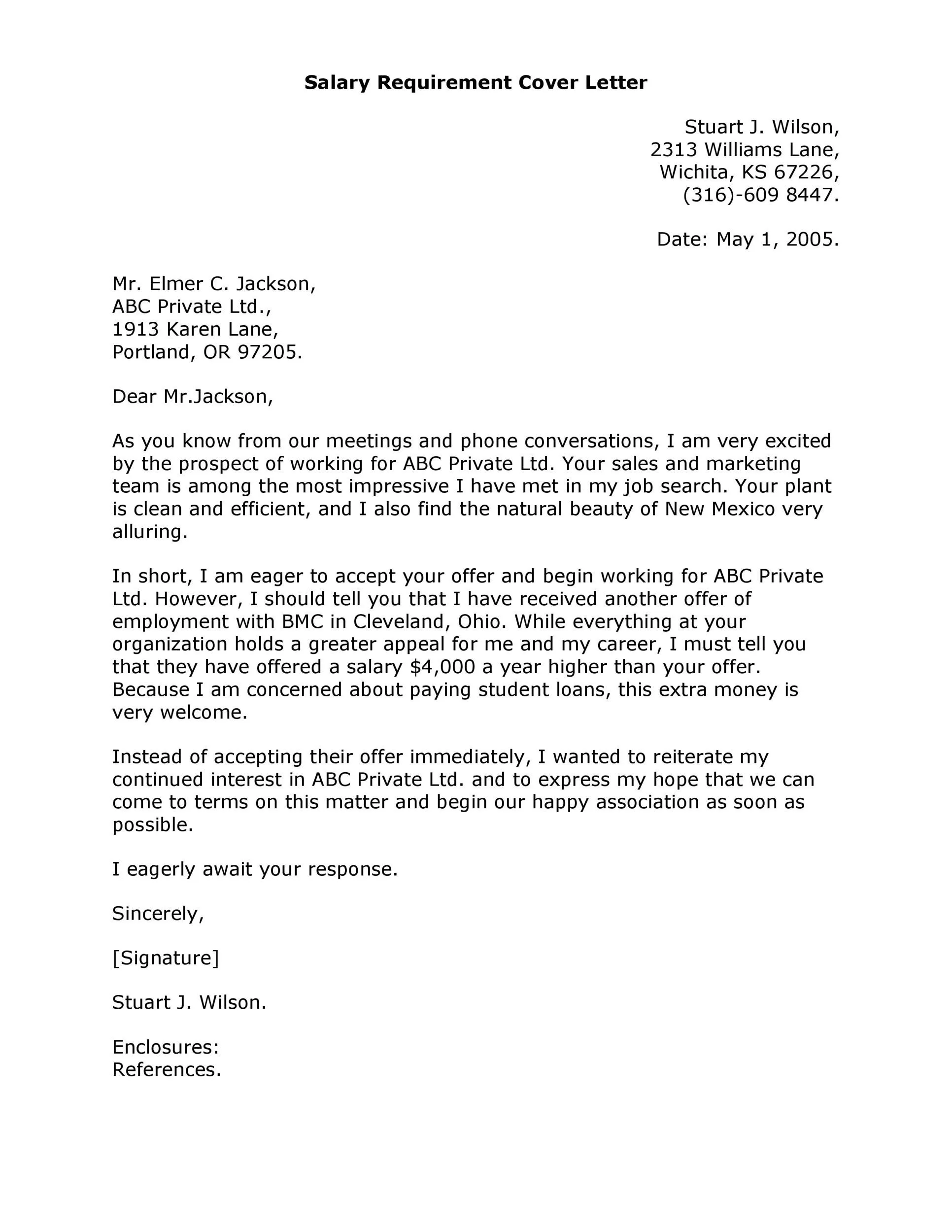
Avoiding common mistakes is just as important as knowing the best practices for stating salary expectations. These mistakes can hurt your chances of getting the job or put you at a disadvantage during salary negotiations. Being aware of these pitfalls will help you navigate the salary discussion more effectively, ensuring you present yourself as a professional candidate. Whether it’s being too vague, demanding too much, or completely avoiding the topic, understanding what not to do will help you put your best foot forward.
Being Too Vague
Being too vague, such as stating “negotiable” or “competitive salary”, may come across as avoiding the topic. It can leave the employer uncertain about whether they can afford you and can sometimes lead to your application being disregarded. This is because the employer may not want to waste time with candidates whose expectations are unknown. Be specific and be prepared to discuss your desired salary range to show your seriousness about the position.
Demanding Too Much
Demanding a salary that is significantly higher than the average for the role, especially if your experience doesn’t fully match, can be detrimental. Even if you have exceptional skills, an excessive demand may cause employers to pass over your application. It is essential to be aware of the market rates. Be realistic about your expectations, and justify your requested salary based on your skills, experience, and the value you bring to the company. Be confident in your asking price and justify your skills.
Not Mentioning Salary
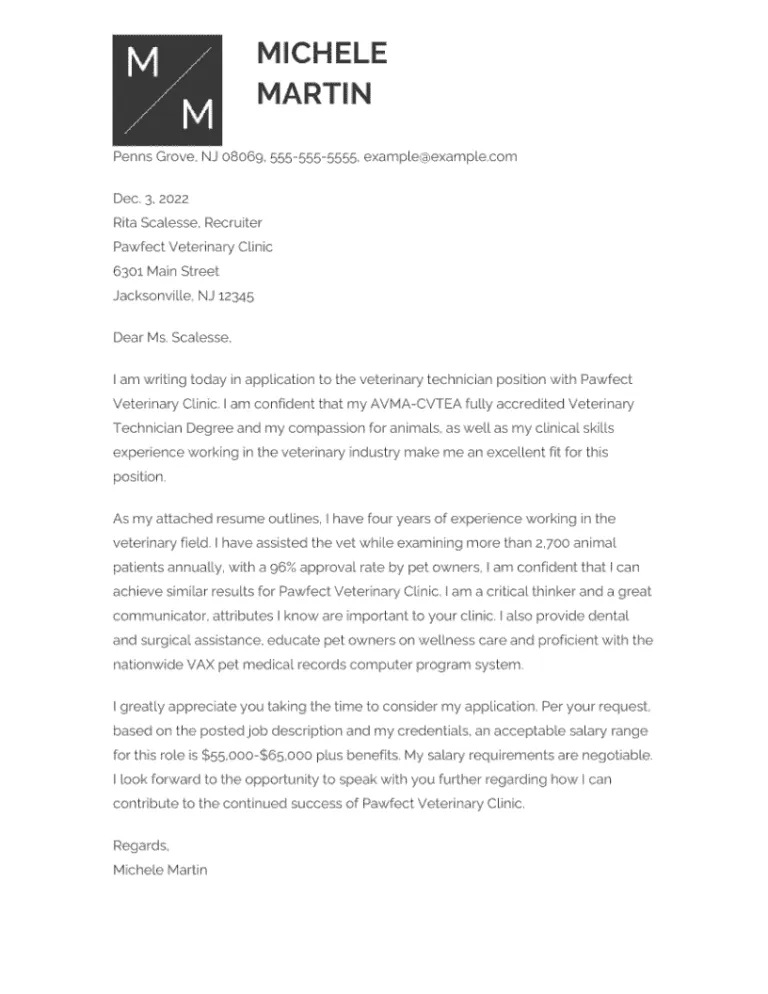
While it’s tempting to avoid the salary question altogether, not addressing salary can also be a mistake. It may be perceived as not being prepared or not taking the job application seriously. In many cases, the hiring manager will want to know your salary expectations before scheduling an interview. If the job description specifically requests this information, failure to provide it could result in your application being automatically rejected. Take the chance to prepare a salary range before applying.
Negotiating Salary After the Cover Letter
The cover letter is just the first step, and the real negotiation typically happens during the interview or when you receive an offer. This is where your research and confidence will come in handy. Be prepared to justify your salary expectations with your skills, achievements, and the value you bring to the company. If the initial offer is lower than your expectations, don’t hesitate to negotiate. It’s your chance to demonstrate your value and reach a mutually beneficial agreement. Consider the entire compensation package, including benefits, bonuses, and opportunities for advancement, when negotiating. Be prepared to walk away if the offer doesn’t meet your needs, and remain professional throughout the process.
